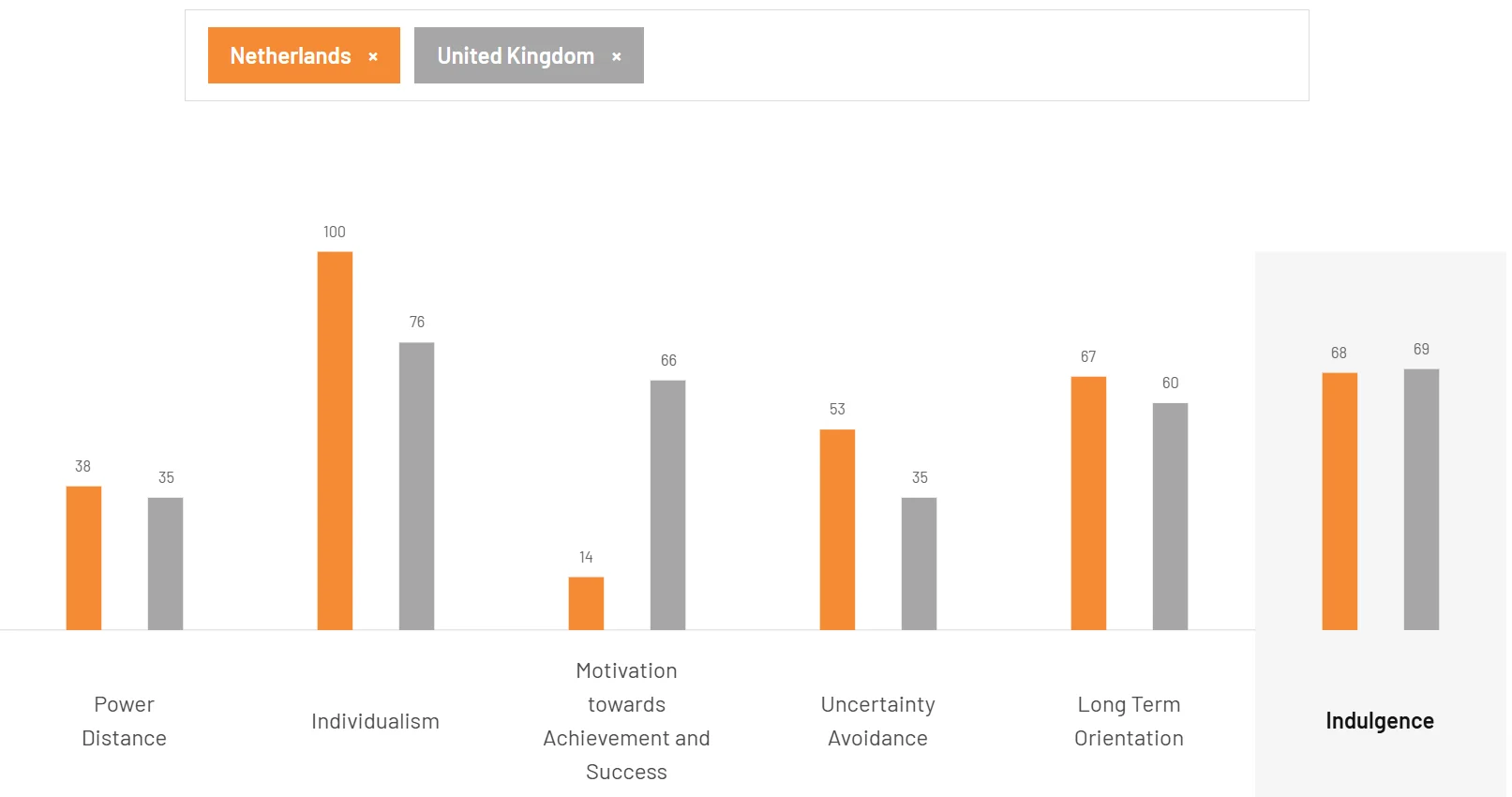- Type Assignment
- Downloads891
- Pages5
- Words1173
Introduction
Organisational culture means a set of values, beliefs, systems and rules that influence the behaviour of customers. The essay will describe the culture of two countries, Holland and the UK, and review the impact of culture on multinational businesses. The culture of the country has a great influence on the working of the business, and understanding these aspects is essential for those seeking assignment writing help to analyse cross-cultural management topics effectively.
Culture of Holland and the UK
Culture is defined as shared values, attributes, goals as well as practices. Each country has a different culture because of differences in norms, values, traditions, customs and so more. The Hofstede dimensional model is a significant tool for evaluating the cultures of different countries. Hofstede model effectively describes the relationship between culture, society, and individuals and has six different factors (Minkov and Kaasa2021). Referring to the Hofstede dimensional model, the culture of Holland and the UK is as under:
Organisational Culture: Holland vs UK Assignment Sample
![Culture of Holland and the UK Culture of Holland and the UK]()
(Source: Country Comparison tool. 2024)
- Power Distance: It refers to the way individuals in society relates to each other on a hierarchal scale (Stępień and Dudek, 2021). According to the Hofstede model, Holland scored low on dimension 38, which means that within the organisational culture, everyone has freedom, equal rights, accessibility to superiors, and management facilities. In addition, hierarchy is only used for convenience and better working. Apart from this, the UK also scores 35, which means that strives to minimize inequality among the people. The low score demonstrates that organisational culture within the UK and Holland is effective as it provides equal opportunities to all individuals. For instance, employees have the power to share their ideas and opinions in the decision-making process. It leads to furnishing their feeling of value and respect resulting in increased productivity and overall performance of the organisation.
- Individualism and Collectivism: Individualism refers to a society where priorities are given to self and families. On the other hand, collectivist society greater significance is placed on the goals and well-being of the goals. Referring to the Hofstede model, recognized that Holland has a high score of individualism which is 100 while the score of the United Kingdom is 76. The people in such a society significantly think about themselves first and their families as compared to others. The individualism dimension leads to impact cohesion and teamwork within the Holland organisation as compared to the United Kingdom. Due to the individualist culture, employees are not able to work collaboratively as a result of this, the overall productivity as well as effectiveness of the organisation is hampered. This becomes a barrier for the Holland businesses to do innovation with the help of collaboration.
- Motivation towards achievements and success: In the context of the Hofstede model, identified that Holland's score is 14 whereas the United Kingdom's score is 66. In Holland's organisation, businesses must maintain a work-life balance and involve everyone to motivate them. For instance, lack of motivation directly impacts employee performance resulting in increased turnover leads to a decline in company performance. Besides this, organisations in the UK are often success-driven. Companies within the culture motivate their employees via monetary and non-monetary incentives. This leads to encouraging employees to work innovatively, hence helping to provide a competitive edge to multinational businesses.
- Uncertainty avoidance: From the Hofstede model, it is analysed that Holland has a high score in uncertainty avoidance demonstrating that it relies strongly on the set rules as well as ways of doing things. Therefore, the organisations operating within the culture work according to the rules and regulations. Rigid rules within the company make organisational culture frustrating and, as a result directly impact employees' productivity and organisational performance adversely (Ashok et al, 2021). On the other hand, the UK has a low score of 35 in the uncertainty avoidance index. It demonstrates that organisations within the UK have employees with greater comfort with ambiguity, have more entrepreneurial ability and are more likely to take risks while less dependent on structured rules. It makes employees more innovative, risk-taker and productive, hence significantly enhancing organisational performance in complex and dynamic environments.
- Long-term Orientation: According to the Hofstede model, it is articulated the Netherlands and the United Kingdom both have high scores as one has 67 and the other has a 60 score, which means that both countries have a pragmatic nature (Country Comparison tool, 2024). The people in such a culture believe that truth is based on the context, situation and time. Organisations working in Holland and the United Kingdom are paying greater attention towards future development. Businesses within such a culture focus on planning and adopting change rapidly according to the requirements. For instance, in the context of long-term orientation, UK organisation more rapidly adopt changes such as technological advancement, and sustainability within the business as a result grow towards more success. Their employees also become talented and skilled, hence enhancing organisational performance as compared to other countries.
- Indulgence and Restraint: Indulgence refers to a culture that values the satisfaction of human requirements and desires while restrain culture refers to a culture that values curbing an individual’s desires (Heydari et al, 2021). Referring to the Hofstede dimensional model, it is identified that Holland has a high score i.e. 68 as well as the United Kingdom also scores 69 which represents that both countries are indulgent in nature. The people within the society focus on enjoying life and having fun, they give importance to greater leisure time. An individual within such a society prefers to work and live in greater freedom as well as lack of control and under pressure. For instance, employees within the Holland and UK due to indulgent cultures like to enjoy leisure time which helps satisfy their needs and preferences. Satisfied and happy employees during working feel less stress, and depression leads to enhanced employees' enthusiasm, motivation and productivity. In addition, people within an indulgence culture are more risk-takers as a result organisations can get a competitive edge within the complex environment, leading to increased organisational performance.
Conclusion
Feeling overwhelmed by your assignment?
Get assistance from our PROFESSIONAL ASSIGNMENT WRITERS to receive 100% assured AI-free and high-quality documents on time, ensuring an A+ grade in all subjects.
To sum up, it has been articulated that each country has a different culture based on their values, norms and customs. It is concluded from the essay that Holland and the UK have the same culture in terms of power distance, long-term orientation, and indulgence, as both countries less focus on hierarchy and have a pragmatic and indulgence nature. It helps the company to build organisational culture accordingly, resulting in enhanced company performance.
References
Books and Journals
- Ashok, M., Al Badi Al Dhaheri, M.S.M., Madan, R. and Dzandu, M.D., 2021. How to counter organisational inertia to enable knowledge management practices adoption in public sector organisations. Journal of Knowledge Management, 25(9), pp. pp.2245-2273.
- Heydari, A., Laroche, M., Paulin, M. and Richard, M.O., 2021. Hofstede's individual-level indulgence dimension: Scale development and validation. Journal of Retailing and Consumer Services, 62, p.102640.
- Minkov, M. and Kaasa, A., 2021. A test of Hofstede's model of culture following his approach. Cross Cultural & Strategic Management, 28(2), pp.384-406.
- Stępień, M. and Dudek, M., 2021. Toward the three-level poWer diStance concept: expanding geert hofStede’S poWer diStance Beyond croSS–cultural context. Studia Socjologiczne, (1 (240)), pp. 61-87.
Online
- Country Comparison tool. 2024. Online. Available through: < https://www.theculturefactor.com/country-comparison-tool?countries=netherlands%2Cunited+kingdom >

